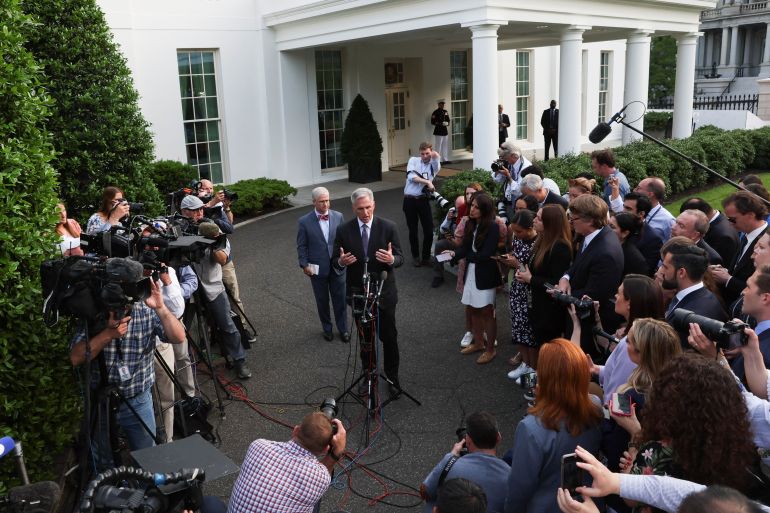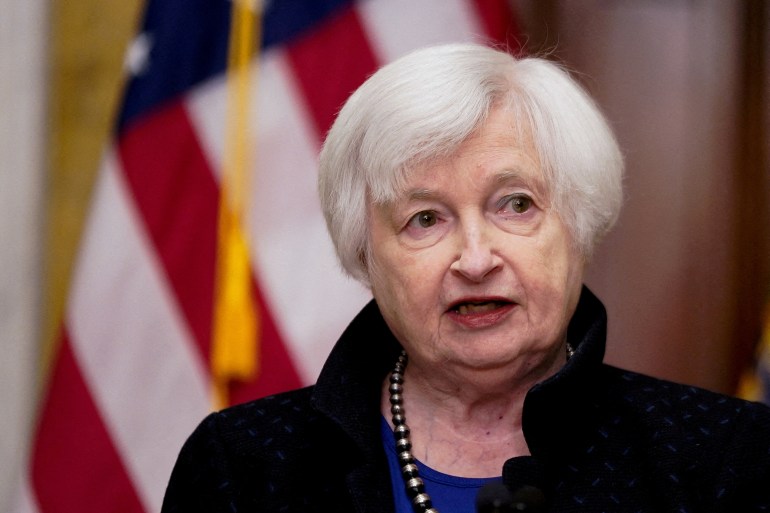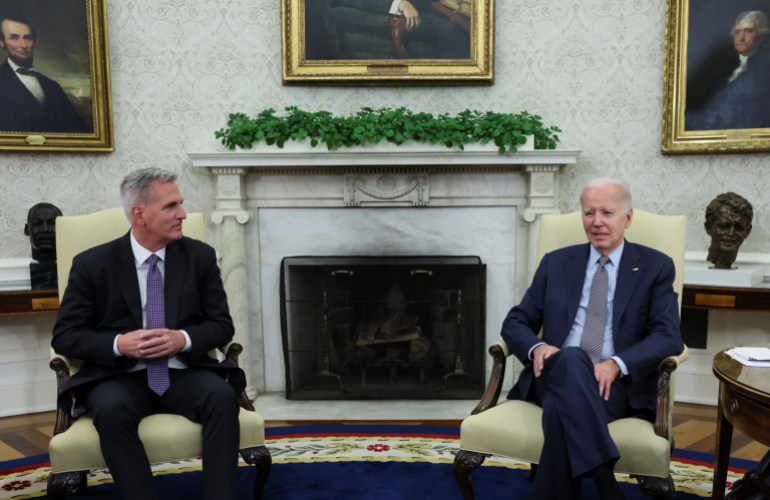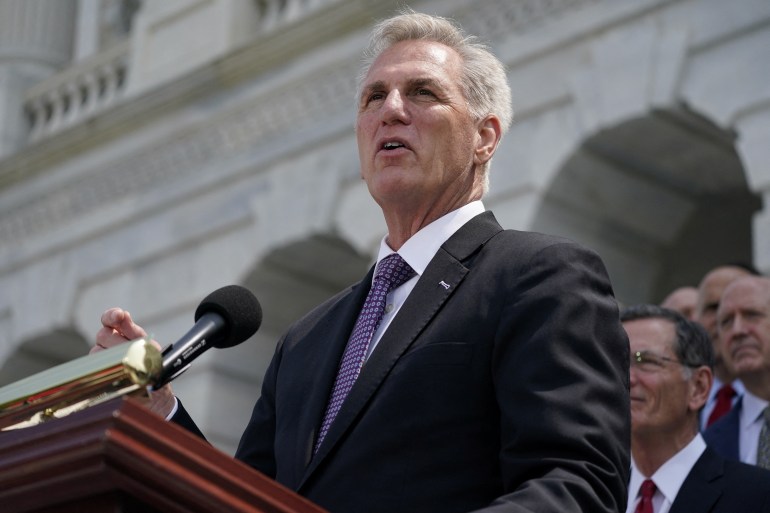Biden and McCarthy resume talks as US debt ceiling deadline looms
Their meeting comes as US Treasury Secretary Janet Yellen issues third letter in three weeks, warning of a June default.

United States President Joe Biden, a Democrat, has held a sit-down meeting with Republican House Speaker Kevin McCarthy to discuss raising the country’s debt ceiling, which limits how much the federal government can borrow to pay its accounts.
But once again, a solution to the country’s impending debt crisis remains elusive as the government hurtles towards the prospect of running out of funds as early as June.
Keep reading
list of 3 itemsBiden warns ‘millions of jobs’ at risk if debt ceiling not raised
Debt ceiling worries deepen as early June US default reinforced
Still, McCarthy struck a note of optimism as he left the White House on Monday. “I think the tone tonight was better than any other time we’ve had discussions,” McCarthy told reporters at a press conference. “I felt it was productive.”
North Carolina Representative Patrick McHenry, part of the Republican negotiating team, echoed that assessment.
“We’ve had tough meetings. We’ve had difficult meetings. This meeting was productive,” McHenry said at the press conference. “It told us, as the negotiating team, a little more of the details we need to get to a package — a package that can pass Congress.”
McCarthy added that he felt a deal to raise the debt ceiling is within reach before the June deadline — “I believe we can get it done” — but he offered few details about what compromises, if any, either side was willing to make.
“There’s nothing agreed to. Everything’s being talked about,” he said, teasing that negotiators would “work through the night” on possible solutions.
The $31.4 trillion debt ceiling has become a perennial subject of political impasses in recent years, as Republicans seek to limit government spending by slashing social welfare programmes, a prospect many Democrats balk at.
The Biden administration, meanwhile, has previously called for a “clean” debt ceiling increase without conditions attached. Separately, Biden has called on wealthy Americans and big corporations to pay “their fair share” in taxes in order to increase government revenue and address the national debt.

‘Highly likely’ to default by early June
Monday’s White House meeting comes shortly after Treasury Secretary Janet Yellen issued her third letter to Congress in as many weeks, urging legislators to act “as soon as possible”.
Yellen’s missive on Monday emphasised that “it is highly likely” the US government could begin to default on its payments as early as June 1, a deadline less than a week and a half away.
She also warned that the political deadlock has already resulted in real-world consequences. “We have already seen Treasury’s borrowing costs increase substantially for securities maturing in early June,” she wrote.
“If Congress fails to increase the debt limit, it would cause severe hardship to American families, harm our global leadership position, and raise questions about our ability to defend our national security interests.”
Economists have predicted that if the US government defaults on its loans, it could potentially trigger a recession and drop the country’s credit rating, resulting in higher interest rates and greater overall strain on the economy. Veterans, Social Security recipients and other individuals and businesses reliant on government funds could see their payments stopped or delayed.

Fitful negotiations and an abridged trip
Flurries of negotiations preceded Monday’s White House meeting, as members of Biden’s and McCarthy’s respective camps met to hammer out details.
The discussions came after a fitful weekend of negotiations. On Friday, talks between White House advisers and congressional Republicans hit a standstill when McCarthy ended the negotiations abruptly.
He credited the “pause” to frustration with the White House and a lack of progress in the negotiations. Talks briefly resumed later that evening.
Biden, at the time, was in Japan for the Group of Seven (G7) summit as part of a trip that originally included stops to allies in the Pacific region. However, amid criticism for being absent for key debt negotiations, Biden’s team cut the trip short, cancelling scheduled visits to Australia and Papua New Guinea.
As he flew from Japan back to Washington, DC, on Sunday, Biden spoke to McCarthy via telephone, rekindling the debt negotiation talks. Both sides emerged optimistic.
“It went well. We’ll talk tomorrow,” Biden said to reporters as he landed in the US. McCarthy, meanwhile, described the call as “very productive”, affirming that he felt they could find “common ground”.
In the wake of Sunday’s phone conversation, negotiators met for more than two hours at the US Capitol on Sunday night and again for nearly three hours on Monday, laying the groundwork for the two leaders to meet.

Republicans push existing bill
Following Monday’s White House meeting, McCarthy once again rejected the prospect of a “clean” debt ceiling increase, saying that he would only lift the country’s borrowing limit if government spending were curtailed.
He also dismissed the possibility of cutting defence funds in order to cap government spending, as well as authorising a short-term extension on the debt ceiling.
“I don’t think a short-term extension benefits anybody,” McCarthy told reporters. “If it’s a short-term extension, I think the country looks like somehow we failed, that we can’t do the job we’re supposed to do.”
Republicans have proposed curbing spending for the next fiscal year at 2022 levels, but the White House is angling to keep government expenditures at 2023 levels.
Another question on the negotiating table is how long such a spending cap would last: Republicans are pushing for six years, down from 10. But Democrats are hoping to limit any spending limits to a two-year deal, to allow government expenditures to adjust with inflation.
Republican negotiators like McHenry have also continued to tout a bill passed through the House of Representatives in April, one that would lift the debt ceiling by $1.5 trillion in exchange for concessions that take aim at Biden’s domestic platform.
The bill would heighten work requirements for recipients of government safety-net programmes like Medicaid and the Supplemental Nutrition Assistance Program, and claw back a funding increase for the Internal Revenue Service that is projected to boost federal revenue.
It would also block Biden’s signature student relief loan initiative and end tax breaks for renewable energy as part of the Inflation Reduction Act. Biden previously threatened to veto the bill if it reaches his desk.
“We have a position. We’ve passed it out of the House. The president, for days, for weeks, for months, demanded we pass a product. We passed a product. We’re here negotiating,” McHenry said on Monday. “No detail’s resolved until it’s all resolved.”